- Like
- Digg
- Del
- Tumblr
- VKontakte
- Buffer
- Love This
- Odnoklassniki
- Meneame
- Blogger
- Amazon
- Yahoo Mail
- Gmail
- AOL
- Newsvine
- HackerNews
- Evernote
- MySpace
- Mail.ru
- Viadeo
- Line
- Comments
- Yummly
- SMS
- Viber
- Telegram
- Subscribe
- Skype
- Facebook Messenger
- Kakao
- LiveJournal
- Yammer
- Edgar
- Fintel
- Mix
- Instapaper
- Copy Link
Did you know that it is common to test on animals and incorporate animal byproducts in the production of condoms, tampons, and pads? Luckily, cruelty-free options are easy to find! Switching to vegan health and intimacy products improves the lives of animals, humans, and the planet, and there are plenty of options.
We’ve compiled a list of some of the best choices to make your transition easy!
Animal Testing & Cruelty
All vegan health and intimacy products are free of animal byproducts, which means you’re not supporting the cruel meat, dairy, or egg industries. Unlike some brands, vegan companies never test their products on animals.
Buying from vegan companies not only protects the animals but can also save you money on products that last for several years. Most companies recommend investing in several reusable cups and pads to use per week. This kind of investment may seem expensive at first, but people often end up saving a lot of money. Customers of GladRags, a company that sells reusable pads and eco-friendly menstrual cups, claim that they have saved over $500 within a few years. According to GladRags, just one reusable pad can replace 120 disposable pads!
Health Benefits
Companies that are vegan-certified and FDA-approved provide better working conditions for their employees and locally source ingredients like cotton and rubber. Vegan menstrual cups and reusable pads are either designed with the highest medical grade TPE or silicone, which are considered safer for the body. These tampons, pads, and menstrual cups also avoid the use of chemicals that are associated with deaths caused by toxic shock syndrome, or TSS. Vegan condoms tend to be free of gluten and are made of all-natural latex as well as silicone. The following brands free of animal products also note that their condoms have been electronically tested by the FDA and are as effective as other condom brands.
Environment
Overall, vegan health and intimacy products are much more eco-friendly. The use of reusable products leads to less waste, and less plastic pollution harming marine life. Plastic waste poses many dangers to aquatic animals, including accidental ingestion and smothering vital coral reef habitats.
Regular Condoms
Harmful to the animals: The animal industry profits by including their waste or remaining animal products—such as casein, bones, and gelatin—in condoms. Because condoms are considered to be medical tools (to prevent pregnancies and diseases), it is common practice for companies to test them on animals in order to be certified as functioning and efficient.
Harmful to the environment: The rubber that most companies use in the production of their condoms is not locally sourced; therefore, more energy is required to transport the ingredients.
Harmful to us: Latex and glycerin (usually added to lubricated condoms) may cause allergic reactions or yeast infections for some people. Also, condoms that contain spermicides are less expensive, but may be irritative. Additionally, nitrosamine, found in mainstream condoms, is generally carcinogenic.
Vegan Options
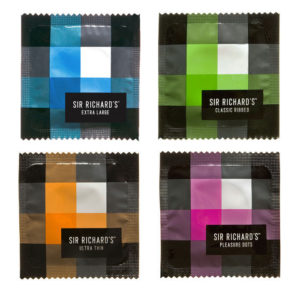
Price: $25.00/pack of 36 condoms
Where to find: sirrichards.com, Amazon, CVS, Kroger, Whole Foods Market
- For every purchase, the company donates its condoms to communities in need.
- Reviews: These condoms run a bit tighter than other vegan condoms and may carry a subtle plastic odor. They are ultra sensitive and overall comfortable for people.
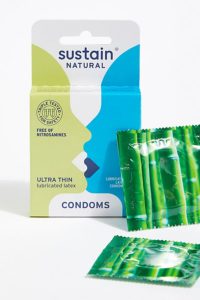
Price: $13.99/pack of 10 condoms
Where to find: Whole Foods Market, Kroger, Harris Teeter, Bed Bath & Beyond, Amazon, sustainnatural.com
- Each condom is electronically tested for safety and is FDA approved.
- The rubber is sourced from a community where people are provided with free education, healthcare, and fair wages.
- Reviews: The condoms are fairly priced and are neither irritating nor odorous. Most customers claimed that the most comfortable size was the Large Comfort Fit.
Other Vegan Options: GLYDE
Regular Tampons
Harmful to the animals: Many tampons are bleached with chlorine, a chemical that is tested on animals. Rabbits are harmed in the process of testing the TSS toxin to measure their response to lethal shock.
Harmful to the environment: On average, a menstruating person will dispose of 250-300 pounds of menstruation products in their lifetime. This number includes up to 16,800 tampons, most of which come with plastic applicators that are often found on beaches and in landfills.
Harmful to us: Constantly refilling our tampon stash is too expensive! Menstrual cup alternatives last up to
four years, saving you money. Plus, most mainstream brands do not use hypoallergenic cotton. Rather, they include chlorine, fragrance, chemicals, dyes, and synthetics in their tampons.
Vegan Options
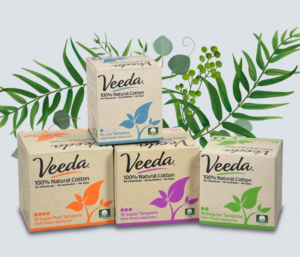

Price: $7.49/box of 14 pads & $16.99/box of 42 pads
Where to find: Giant, Shoppers, Wegmans, Costco, Bed Bath & Beyond, Walmart, CVS, Walgreens, Amazon, veedausa.com
- Veeda uses recyclable packaging material and biodegradable cotton.
- Offers both non-applicator and applicator tampons: they are biodegradable, and gynaecologically as well as dermatologically tested.
- Reviews: Consumers say that Veeda non-applicators are very leak resistant. They are non-irritating and the lite ones are especially comfortable.
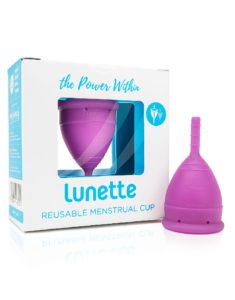
Price: $32.00 – $39.99/cup
Where to find: Amazon, CVS, Walgreens, Target, store.lunette.com
- Lunette cups are eco-friendly, reusable, and last up to several years.
- Reviews: Lunette cups are smaller and more flexible than the DivaCups, which make it easier for insertion and removal. Lunette is comfortable because it is the perfect balance of firm and soft.
Other Vegan Options: The DivaCup, MeLuna Cup
Regular Pads
Harmful to the animals: Just like with tampons, chemicals in pads—such as parabens and chlorine—are tested on animals.
Harmful to the environment: It takes a long time for the plastic packaging of pads to decompose. Plastic pollutes our waters, and many resources are wasted since pads must be thrown out continuously.
Harmful to us: Restocking pads is expensive and mainstream companies are not transparent with the ingredients and toxins that are included in pads. With reusable pads, generally there are no chemicals, synthetics, nor dyes included. Unlike mainstream companies, companies that sell vegan health and intimacy products are gynaecologically and dermatologically tested.
Vegan Options

Price: $24.00 – $35.00/pair
Where to find: shethinx.com
- THINX sells period-absorbing underwear that come in various styles depending on the customer’s heaviness of flow.
- Each pair is crafted in a family-run factory in Sri Lanka where female workers participate in an empowering program called “Women Go Beyond.”
- Reviews: The Hi-Waist and the Hiphugger underwear are the most comfortable and absorbent types of underwear from the shop.
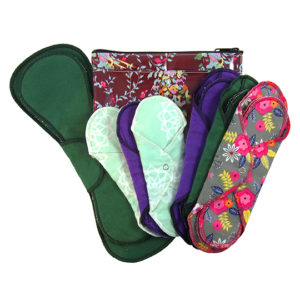
Price: $15-$20/daytime pad & $20-$30/nighttime pad
Where to find: MOM’s Organic Market, Whole Foods Market, Amazon, gladrags.com
- Customers can customize the absorbency of their reusable daytime pads by adjusting the number of inserts.
- Reviews: Some say that the pads slide back and forth a bit since they are not adhesive and have a snap button instead. In general, most people claim that the pads stain easily and GladRags’ reusable pads should be used for days when their period is lighter.
Organyc
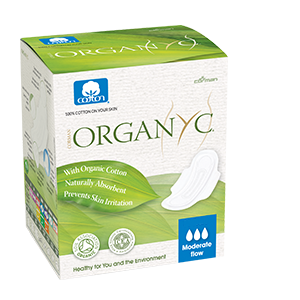
Price: $5.79/box of 10
Where to find: Walmart, CVS, Walgreens, Amazon, Harris Teeter, Costco, organyc-online.com
- The disposable pads are bleached with hydrogen peroxide—a safe and naturally occurring disinfectant—instead of chlorine.
- Organyc has received many respectable certificates such as the ICEA (The Ethical and Environmental Certification Institute) proving the company’s favorable working conditions and eco-friendly status.
- Reviews: Customers with sensitive skin loved switching to Organyc because they could feel an improved difference in their skin. Reviews also mentioned that the pads are very soft, absorbent, and comfortable.
Other Vegan Options: Pink Lemonade
Ultimately, there are numerous benefits to switching to vegan health and intimacy products. We hope this list helps you find an alternative to traditional care products.
With just a little effort, we can reduce our exploitation of animals beyond our diet—by investing in vegan companies, we’re showing more love towards the animals, the environment, and ourselves.
 About Soleil Ephraim
About Soleil Ephraim
Soleil is an outreach intern at Compassion Over Killing and will be a sophomore at William & Mary this fall. She has been a vegetarian for 11 years and vegan for one. Soleil hopes to improve her skills as an advocate for equality and ethical consumer, and was inspired to research vegan health and intimacy products to make discussions about periods and sex less taboo. Soleil hopes to further explore the intersections of the environmental justice movement, animal rights movement, and feminism.
Featured Photo: Intimina @ Flickr.com

Comments 1
Thank you so much! This is a really comprehensive article. I have been trying some of these products, and they are great! It is so great to read such a well-informed article about topics that are not so commonly talked about in many of the settings I am in. It is inspiring to see such positive change being promoted. 🙂